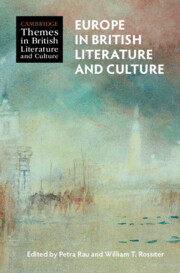Book contents
- Europe in British Literature and Culture
- Cambridge Themes in British Literature and Culture
- Europe in British Literature and Culture
- Copyright page
- Contents
- Illustrations
- Contributors
- General Editor’s Preface
- Acknowledgements
- Introduction
- Part I Zones of Influence
- Part II Pan-European Moods and Movements
- Chapter 7 Renaissance
- Chapter 8 The Enlightenment
- Chapter 9 Romanticism
- Chapter 10 The Gothic
- Chapter 11 Modernism
- Part III Cultural Transfers
- Part IV Anxious Neighbourhoods, Uncertain Futures
- Index
Chapter 11 - Modernism
from Part II - Pan-European Moods and Movements
Published online by Cambridge University Press: 06 June 2024
- Europe in British Literature and Culture
- Cambridge Themes in British Literature and Culture
- Europe in British Literature and Culture
- Copyright page
- Contents
- Illustrations
- Contributors
- General Editor’s Preface
- Acknowledgements
- Introduction
- Part I Zones of Influence
- Part II Pan-European Moods and Movements
- Chapter 7 Renaissance
- Chapter 8 The Enlightenment
- Chapter 9 Romanticism
- Chapter 10 The Gothic
- Chapter 11 Modernism
- Part III Cultural Transfers
- Part IV Anxious Neighbourhoods, Uncertain Futures
- Index
Summary
This chapter discusses how British modernists engaged with Europe. It takes account of the wider landscape of modernists active on British soil: the impact of art circulation (including key moments like the vogue for Ivan Meštrović, British performances of the Ballets Russes, and F. T. Marinetti’s visit to England), continental European travel and residence, translation, the rise of disciplines like anthropology, attitudes like ‘Byzantinism’ and ‘primitivism’, and the redrafting of European nation-state boundaries. For key figures such as W. B. Yeats, Wyndham Lewis, and Virginia Woolf, one of the driving forces of British modernism was the question of what Europe is and what it might become if its geographical, cultural, and social boundaries were redefined. British modernists’ interest in Europe was intimately connected to their obsession with borders and boundaries – of spaces, political possibilities, customs, conditions, and humans. Reimagining others and themselves as insiders, outsiders, or in-outsiders, the writers and artists of the period adopted a range of identities (from regional identities to British to European and/or cosmopolitan) and developed corresponding artistic practices.
- Type
- Chapter
- Information
- Europe in British Literature and Culture , pp. 180 - 196Publisher: Cambridge University PressPrint publication year: 2024

